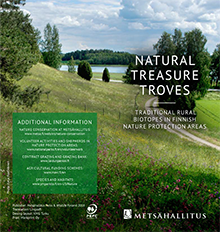Natural Treasure Troves – Traditional Rural Biotopes in Finnish Nature Protection Areas
Beautiful meadows, wooded pastures and grazed woodlands, otherwise known as traditional rural biotopes, are some of our most diverse and most endangered natural resources. The species found in these biotopes are ancient, dating back to the plains formed after the last Ice Age. In the 1900s, the area occupied by meadows shrank drastically to less than a percent of the area previously comprised of meadowlands. This led to a rapid decline in species. Today, a quarter of our endangered species in Finland live primarily in our traditional rural biotopes. Colourful butterflies flying above flowery summer meadows, busy bumblebees and wading birds in coastal meadows are part of our unique and precious nature, which needs our help to survive.
Management is a co-operative effort involving numerous actors. The restoration of overgrown meadows starts with clearing. Local service providers are used to remove trees which have taken over the meadows. Volunteers are also an invaluable help. Volunteer camps are organised by, for example, WWF and the Finnish Association for Nature Conservation.
Management is continued with grazing and mowing. The owners of grazing livestock are making an invaluable contribution to the preservation of biodiversity and the landscape. Some 20,000 cows, sheep and horses are hard at work every summer, grazing in nature protection areas. Mowing is currently so rare that each and every area to be mowed is considered vital.
Farmers, organisations and even private persons can receive funding for the restoration and management. Centres for Economic Development, Transport and the Environment (ELY Centres) play a key role by granting funding as well as setting guidelines and ensuring oversight. Various national and EU-funded projects are indispensible, particularly in the early stages of restoration efforts. Guidelines and planning assistance is available from agricultural advisory bodies, such as ProAgria and The Rural Women’s Advisory Organisation.
